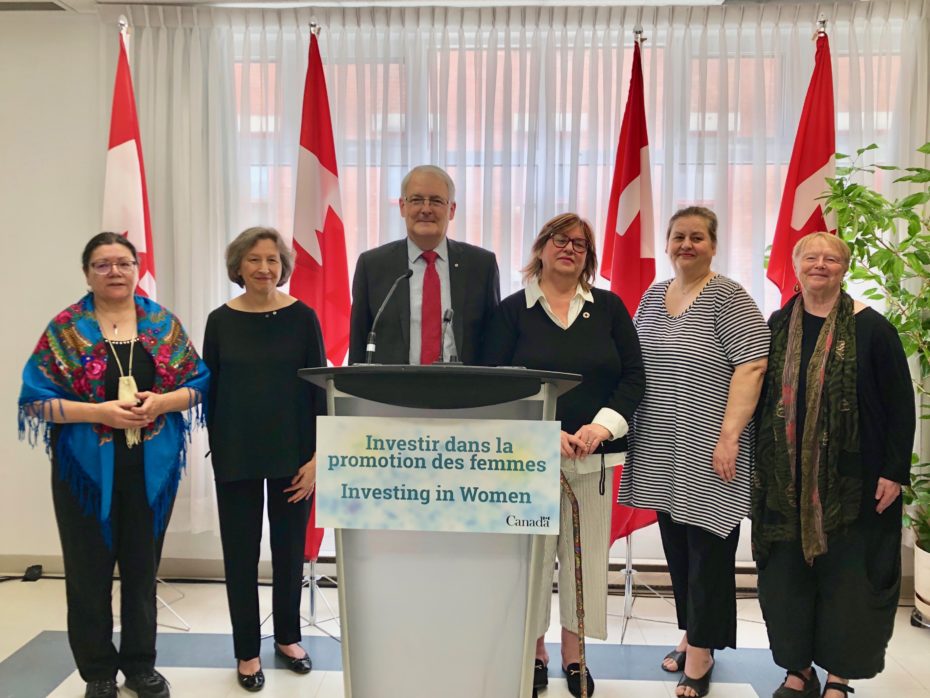
On May 31, at La rue des femmes de Montréal, the Honourable Marc Garneau, Minister of Transport, announced on behalf of the Honourable Maryam Monsef, Minister of International Development and Minister for Women and Gender Equality, an investment of more than $4.49 million for research tackling gender-based violence in Canada. Faculty of Education Professor Claudia Mitchell is the recipient of a grant for $739, 200 for the 4-year project, More Than Words: Studying the Impact of Arts Based Survivor Engagement on Families and Communities. McGill and various partners will contribute additional cash and in-kind contributions, bringing the total investment of more than $2 million to the project.
Mitchell is McGill’s leading researcher on visual and other participatory methodologies in community engaged research. Much of her work has focused on issues facing girls and young women and on how visual tools – such as cellphilms, short films produced on mobile devices – can promote community and policy dialogue. Mitchell has worked aiding youth in Canada and in countries such as South Africa, Rwanda, Russia and Ethiopia. More Than Words will focus on Indigenous communities in three geographical areas in Canada: Eskasoni (Nova Scotia), Rankin Inlet (Nunavut) and Treaty 6 Territory/Saskatoon (Saskatchewan). More sites will be added as the project progresses.
Expanding reach of previous project
More Than Words expands the reach of Mitchell’s previously funded partnership project, Networks for Change, a $2.4 million SSHRC/IDRC-funded study with Indigenous girls and young women in Canada and South Africa, and links to her involvement with fellow McGill professor Shaheen Shariff’s SSHRC Partnership Project, Impacts: Sexual Violence in Canadian Universities. As in the aforementioned studies, youth will actively participate in the research conducted throughout the duration of the More Than Words project.
“With this significant investment from the Government of Canada, Indigenous youth will lead innovative, arts-based projects to prevent and address sexual and gender-based violence in their communities,” said Christopher Manfredi, Provost and Vice-Principal (Academic). “Driven by First Nations, Métis and Inuit priorities, More Than Words will also train mentors and highlight opportunities to support personal wellness and mental health at McGill University.”
Looking for leadership among girls and young women
For Mitchell, the success of the project depends on building mentorship, leadership and facilitation skills of young people to take participatory arts-based work further, by involving younger participants in the community, and by ‘rolling out’ these approaches to other community members.
“I cannot emphasize enough how important it is for Indigenous girls and young women, who have already developed amazing skills in relation to addressing sexual violence through media production and community engagement, to lead the way in mentoring other young people in their community,” said Mitchell. “This type of youth-led work is already being supported by various community partners such as the Canadian Women’s Foundation. Having four years of funding to develop and implement a blueprint for how arts-based work can be adapted in more communities is key. I would like to acknowledge the commitment of the all the community partners who signed on to be part of this project, and to thank WAGE (Department for Women and Gender Equality), along with SSHRC, IDRC and the Trudeau Foundation for their financial support.”
McGill was among five organizations based in Quebec who received funding. In Canada, the Department for Women and Gender Equality (formerly Status of Women Canada) has estimated the economic impact of intimate partner violence and sexual assault to be over $12 billion annually.
“I am proud to be part of a government that is committed to end gender-based violence,” said The Honourable Marc Garneau, Minister of Transport, at the announcement in Montreal. “If we hope to end gender-based violence we must provide the necessary resources to the experts and those who confront it daily. Our government’s Strategy to Prevent and Address Gender-Based Violence would not be possible without the knowledge, dedication and hard work of the organizations and people here today.”
